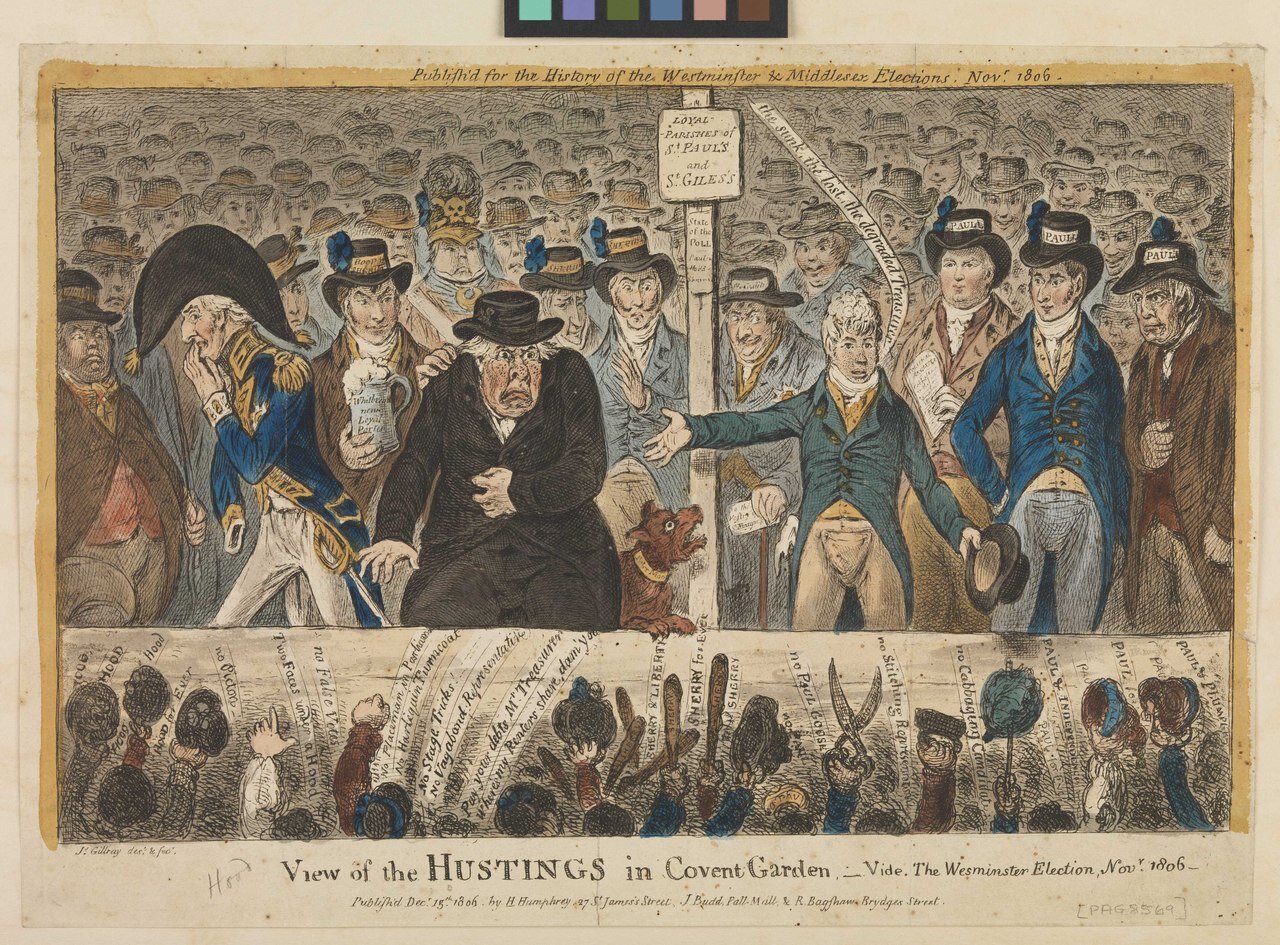10 February 2021
How did a Greek root referring to the uterus come to mean a state of overwhelming emotion? Through a combination of medieval medicine and many centuries of misogyny, that’s how.
The English word hysteria comes from the post-classical Latin combining form hystero-, which in turn from the ancient Greek ὑστέρα (ystera), meaning the uterus. And hysteria once referred to a supposed physical disease in women caused by dysfunction or displacement of the uterus. The uterus was thought to move up, constricting or blocking the heart or throat. Hysteria was characterized by agitation, difficulty breathing or a sensation of choking, tightness of the chest, and other symptoms. These symptoms roughly correspond to those of the modern, and very real, panic disorder.
But this supposed disease of women was not always labeled hysteria. Long before, the name for this supposed condition was suffocation / rising / fit of the mother. The word mother was also used as a label for the uterus. This English sense of mother is a calque of the Latin matrix, referring to a female breeding animal, or in humans, the womb.
An Anglo-Irish medical text from c. 1300 has the following:
Item pro subbito assensu matricis, hoc est aþye þe verliche rakynggys off þe modyr to wommanhis hert.
(Item, for a suddenly ascending womb, that is for the sudden stretching of the mother to the woman’s heart.)
An John Trevisa’s late fourteenth-century translation of Bartholomaeus Anglicus’s De proprietatibus rerum (On the Properties of Things) has this:
The modir in a womman is a singuler membre disposid as a bladdre, & kynde haþ ordeyned þat membre to fonge & resseyue þe humour semynal.
(The mother in a woman is a distinct organ arranged as a bladder and nature has ordained that organ to receive and hold the seminal fluid.)
Bartholomaeus’s original Latin is matrix.
And by c.1450 we see suffocation of the mother in a leechbook, or medical text.
For the suffocacion of the modir lat hir receyue þe smoke of turpentyne laid upon the coles þorow hir mouth.
(For the suffocation of the mother let her receive the smoke of turpentine laid upon the coals through her mouth.)
By the turn of the seventeenth century, we see the adjective hysterical used to refer to the supposed disease. This is part of a general trend toward coining words from Latin and Greek roots that began in the Early Modern era. From Edward Jorden’s 1603 A Briefe Discovrse of a Disease Called the Suffocation of the Mother:
Now I come to the kinds and sorts of this disease, which may bee reduced vnto three principall heades, according as euerie part of the bodie belongeth vnto some of the three principall functions which do gouerne the bodie of man. Not that euerie Symptom in this disease doth hurt some of the three functions, for some are onely molestations or deformities, as sudden Collickes, windie humors, noyses, alteration of colour, &c. But because euerie part may well bee mustred vnder some of these generals: and we doe seldome see any hystericall affect wherein some one or mo of the functions are not affected. These functions as they are distinct in office, so they possesse in our bodies seuerall seats and haue seuerall instruments belonging vnto them.
And a little more of than a decade later, Helkiah Crooke was writing about how the uterus is attracted to sweet odors, and therefore travels up the abdomen, causing women to become hysterical. From his 1615 Μικροκοσμογραϕια (Mikrokosmographia), an anatomy text:
Placentinus addeth another argument which hee calleth Inuincible, taken from those women that are Hystericall, that is, haue fits of the Mother. For such woemen although they haue no Respiration at all, doe yet receiue and perceiue odours, and not onely so but are almost miraculously redeemed or recouered by them: what shall wee say vnto the wombe it selfe, doth it not smell? yet no man did euer say that the wombe did respire, but dayly experience teacheth vs that it taketh so great pleasure in sweete Smels and is so offended with that which is noysome and abhominable, that it mooueth and applyeth it selfe manifestly vnto the one and auoydeth the other, euen with Locall and Methematicall motion.
The name hysteria, referring to the supposed disease, is in place by 1757, when it appears in the diary of Virginia planter Landon Carter for 9 March 1757:
She goes on with Floods hysteria medicine.
And it appears in Thomas Marryat’s 1764 The New Practice of Physick:
HYSTERIA
Hysteric Fits, notwithstanding the various shapes they appear in, are too well known to need any description,
The cause is an unequal distribution of the electrical fire, owing in some measure to the peculiar conformation of the uterus and its circumjacent parts—suppression or deficiency of the menstrual flux—delicacy of constitution—luxury—want of exercise—strong inclination to venery—Fluor albus—want of blood—acid gas.
The diagnostics. Syncopes—catchings—rising of hte throat, so as to endanger suffocation—convulsions—quick respiration—laughing—screaming—crying—the hands strongly closed—bawdry expressions—cephalalgia, &c.
The prognostics. If the patient has been long troubled with them, they terminate in perpetual causeless timidity—madness, or—all the horrors of the Hypochondriacal Affection,to which this disorder is very similar—It is by no means dangerous or—if scientifically treated, difficult to cure.
The cure. All evacuations are deleterious, the dry vomit excepted, which succeeds wonderfully, if frequently repeated, and is, propriis viribus, sufficient to effect a cure; but if objected to, the practitioner will find various formulae equally elegant and efficacious subjoined.
But by the early nineteenth century, hysteria had acquired a more general sense, and could now be used to refer to overwhelming emotion in both men and women. From Edgar Allan Poe’s 1839 “The Fall of the House of Usher”:
I had taken but a few turns in this manner, when a light step on an adjoining staircase arrested my attention. I presently recognized it as that of Usher. In an instant afterwards he rapped, with a gentle touch, at my door, and entered, bearing a lamp. His countenance was, as usual, cadaverously wan—but there was a species of mad hilarity in his eyes—an evidently restrained hysteria in his whole demeanor. His air appalled me—but any thing was preferable to the solitude which I had so long endured, and I even welcomed his presence as a relief.
And the adjective hysterical would specialize even further, referring to something that was very funny, overwhelming one with fits of laughter. This sense is in place by the early twentieth century, when it appears in a movie advertisement in Dundee Scotland’s Courier and Argus newspaper of 18 May 1925:
Sydney Chaplin in
“The Galloping Fish.”
Five Reels of Hysterical Hilarious Merriment.
Sydney Chaplin was the elder half-brother of the more famous Charlie Chaplin.
And by the twenty-first century, despite the fact that most English speakers would know that a hysterectomy referred to the surgical removal of the uterus, hysteria and hysterical had lost any connotation of the female anatomy in the minds of most.
Sources:
Advertisement. The Courier and Argus (Dundee, Scotland), 18 May 1925, 1. Gale Primary Sources: British Library Newspapers.
Crooke, Helkiah. Μικροκοσμογραϕια: A Description of the Body of Man. London: William Jaggard, 1615, 8.45, 702. Early English Books Online (EEBO).
Dawson, Warren R. A Leechbook or Collection of Medical Recipes of the Fifteenth Century (c.1450). London: Macmillan, 1934, 188. London, Medical Society of London Library MS 136.
Jorden, Edward. A Briefe Discovrse of a Disease Called the Suffocation of the Mother. London: John Windet, 1603, sig. Dr. Early English Books Online (EEBO).
Marryat, Thomas. The New Practice of Physick. Dublin: 1764, 323–24. Eighteenth Century Collections Online (ECCO).
Middle English Dictionary, 2019, s.v. moder, n.
Oxford English Dictionary, third edition, June 2020, s.v. hysteria, n., hysterical, adj. and n., hysteric, n. and adj., hystero-, comb. form2; December 2002, s.v. mother, n.1 (and int.).
Poe, Edgar A. “The Fall of the House of Usher.” Burton’s Gentleman’s Magazine, 5.3, 1 September 1839, 34. Gale Primary Sources: American Historical Periodicals.
Trevisa, John. On the Properties of Things: John Trevisa’s translation of Bartholomaeus Anglicus De proprietatibus rerum (a. 1398), vol. 1 of 3. M.C. Seymour, ed. Oxford: Clarendon Press, 1975, 5.49, 263. London, British Library, Additional MS 27944.


